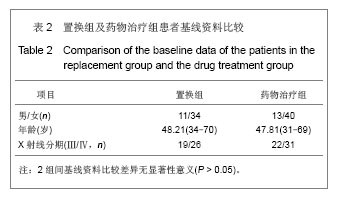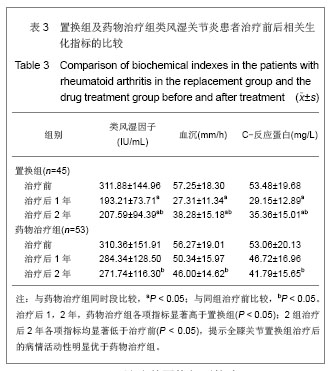| [1]Satoh F, Seto Y, Hasegawa I, et al. Fatal Staphylococcus aureus bacteremia in the Felty syndrome: a maltreatment- suspected case. Legal medicine (Tokyo, Japan). 2012;14(5): 246-248.
[2]Perricone C, Ceccarelli F, Valesini G. An overview on the genetic of rheumatoid arthritis: a never-ending story. Autoimmun Rev. 2011;10(10): 599-608.
[3]Basisht GK, Singh RH, Chandola H. Management of rheumatoid arthritis (Aamavata) using symbiohealth healthcare system. Ayu. 2012; 33(4):466-474.
[4]Desai SS, Myles JD, Kaplan MJ. Suboptimal cardiovascular risk factor identification and management in patients with rheumatoid arthritis: a cohort analysis. Arthritis Res Ther. 2012;14(6): R270.
[5]Aalbers J. Rheumatoid arthritis management options for 2012. Cardiovasc J Afr. 2012; 23(6):355.
[6]Liepe K. Efficacy of radiosynovectomy in rheumatoid arthritis. Rheumatol Int. 2012;32(10):3219-3224.
[7]Schaumburger J, Trum S, Anders S, et al. Chemical synovectomy with sodium morrhuate in the treatment of symptomatic recurrent knee joint effusion. Rheumatol Int. 2012;32(10): 3113-3117.
[8]da Silva E, Doran MF, Crowson CS, et al. Declining use of orthopedic surgery in patients with rheumatoid arthritis? Results of a long-term, population-based assessment. Arthritis Rheum. 2003;49(2): 216-220.
[9]Trieb K, Schmid M, Stulnig T, et al. Long-term outcome of total knee replacement in patients with rheumatoid arthritis. Joint Bone Spine. 2008;75(2): 163-166.
[10]Momohara S, Inoue E, Ikari K, et al. Risk factors for total knee arthroplasty in rheumatoid arthritis. Mod Rheumatol. 2007; 17(6): 476-480.
[11]March LM, Barcenilla AL, Cross MJ, et al. Costs and outcomes of total hip and knee joint replacement for rheumatoid arthritis. Clin Rheumatol. 2008;27(10): 1235- 1242.
[12]Mochizuki T, Saito S. Total knee arthroplasty for massive joint destruction in a patient with rheumatoid arthritis complicated with fibrous dysplasia. Mod Rheumatol. 2009;19(2): 204-208.
[13]Arnett FC, Edworthy SM, Bloch DA, et al. The American Rheumatism Association 1987 revised criteria for the classification of rheumatoid arthritis. Arthritis Rheum. 1988; 31(3): 315-324.
[14]Goodman SM. Rheumatoid arthritis: preoperative evaluation for total hip and total knee replacement surgery. J Clin Rheumatol. 2013;19(4):187-192.
[15]Johnson BK, Goodman SM, Alexiades MM, et al. Patterns and associated risk of perioperative use of anti-tumor necrosis factor in patients with rheumatoid arthritis undergoing total knee replacement. J Rheumatol. 2013;40(5): 617-623.
[16]Pantos PG, Tzioufas AG, Panagiotakos DB, et al. Demographics, clinical characteristics and predictive factors for total knee or hip replacement in patients with rheumatoid arthritis in Greece. Clin Exp Rheumatol. 2013;31(2): 195-200.
[17]Skytta ET, Honkanen PB, Eskelinen A, et al. Fewer and older patients with rheumatoid arthritis need total knee replacement. Scand J Rheumatol. 2012;41(5): 345-349.
[18]Bongartz T, Halligan CS, Osmon DR, et al. Incidence and risk factors of prosthetic joint infection after total hip or knee replacement in patients with rheumatoid arthritis. Arthritis Rheum. 2008;59(12): 1713-1720.
[19]Laskin RS. The classic: total condylar knee replacement in patients who have rheumatoid arthritis. A ten-year follow-up study. 1990. Clin Orthop Relat Res. 2008;466(11): 2589-2596.
[20]March LM, Barcenilla AL, Cross MJ, et al. Costs and outcomes of total hip and knee joint replacement for rheumatoid arthritis. Clin Rheumatol. 2008;27(10): 1235-1242.
[21]Trieb K, Schmid M, Stulnig T, et al. Long-term outcome of total knee replacement in patients with rheumatoid arthritis. Joint Bone Spine. 2008;5(2): 163-166.
[22]Sokka T, Kautiainen H, Hannonen P. Stable occurrence of knee and hip total joint replacement in Central Finland between 1986 and 2003: an indication of improved long-term outcomes of rheumatoid arthritis. Ann Rheum Dis. 2007;66(3): 341-344.
[23]Sharma S, Nicol F, Hullin MG, et al. Long-term results of the uncemented low contact stress total knee replacement in patients with rheumatoid arthritis. The Journal of bone and joint surgery. J Bone Joint Surg Br. 2005;87(8): 1077-1080.
[24]de Hair MJ, Harty LC, Gerlag DM, et al. Synovial tissue analysis for the discovery of diagnostic and prognostic biomarkers in patients with early arthritis. J Rheumatol. 2011; 38(9): 2068-2072.
[25]Ganesan K, Balachandran C, Manohar BM, et al. Effects of testosterone, estrogen and progesterone on TNF-alpha mediated cellular damage in rat arthritic synovial fibroblasts. Rheumatol Int. 2012;32(10): 3181-3188.
[26]Schrama JC, Espehaug B, Hallan G, et al. Risk of revision for infection in primary total hip and knee arthroplasty in patients with rheumatoid arthritis compared with osteoarthritis: a prospective, population-based study on 108,786 hip and knee joint arthroplasties from the Norwegian Arthroplasty Register. Arthritis Care Res (Hoboken). 2010;62(4): 473-479.
[27]Bongartz T, Halligan CS, Osmon DR, et al. Incidence and risk factors of prosthetic joint infection after total hip or knee replacement in patients with rheumatoid arthritis. Arthritis Rheum. 2008;59(12): 1713-1720.
[28]Bartok B, Firestein GS. Fibroblast-like synoviocytes: key effector cells in rheumatoid arthritis. Immunol Rev. 2010; 233(1): 233-255.
[29]Dessein PH, Joffe BI, Stanwix AE. High sensitivity C-reactive protein as a disease activity marker in rheumatoid arthritis. J Rheumatol. 2004;31(6): 1095-1097.
[30]Sokka T, Pincus T. Erythrocyte sedimentation rate, C-reactive protein, or rheumatoid factor are normal at presentation in 35%-45% of patients with rheumatoid arthritis seen between 1980 and 2004: analyses from Finland and the United States. J Rheumatol. 2009;36(7): 1387-1390.
[31]Nakamura H, Tanaka H, Yoshino S. Long-term results of multiple synovectomy for patients with refractory rheumatoid arthritis. Effects on disease activity and radiological progression. Clin Exp Rheumatol. 2004;22(2): 151-157.
[32]Cope AP, Patel SD, Hall F, et al. T cell responses to a human cartilage autoantigen in the context of rheumatoid arthritis-associated and nonassociated HLA-DR4 alleles. Arthritis Rheum. 1999;42(7): 1497-1507.
[33]Murakami M, Hirano T. A four-step model for the IL-6 amplifier, a regulator of chronic inflammations in tissue-specific MHC class II-associated autoimmune diseases. Front Immunol. 2011; 2: 22.
[34]Blass S, Schumann F, Hain NA, et al. p205 is a major target of autoreactive T cells in rheumatoid arthritis. Arthritis Rheum. 1999;42(5): 971-980.
[35]Nakamura H, Nagashima M, Ishigami S, et al. The anti-rheumatic effect of multiple synovectomy in patients with refractory rheumatoid arthritis. Int Orthop. 2000;24(5): 242-245.
[36]Yano K, Ikari K, Inoue E, et al. Effect of total knee arthroplasty on disease activity in patients with established rheumatoid arthritis: 3-year follow-up results of combined medical therapy and surgical intervention. Mod Rheumatol. 2010; 20(5): 452-457.
[37]Momohara S, Inoue E, Ikari K, et al. Efficacy of total joint arthroplasty in patients with established rheumatoid arthritis: improved longitudinal effects on disease activity but not on health-related quality of life. Mod Rheumatol. 2011;21(5): 476-481. |



